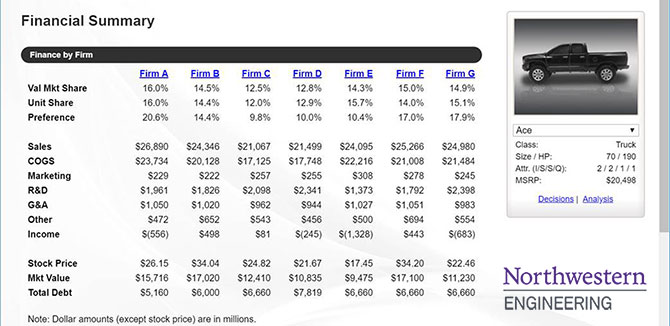Immersing Students in a Business Laboratory
The MEM Engineering Management gateway course introduces students to key business concepts and features a dynamic marketplace to help them practice those lessons.
Northwestern Engineering's Master of Engineering Management (MEM) program features seven required courses. One of those courses is Engineering Management (MEM 402), which exposes students to a business laboratory environment.
This course serves as a gateway course for MEM, and all new incoming students take it together.
Students use fundamental business concepts to develop a strategic mission and execute it over several simulated years of competition utilizing a computerized business simulation. During the competition, teams of students compete in a dynamic marketplace for market share and profitability. In each round of competition, teams must synthesize decisions across the functional areas of the business: marketing, research and development, production, distribution, and finance.
Adjunct faculty member David Semb teaches the course. Semb is a Partner at PriSim Business War Games Inc., where he helps clients use quantitative business techniques to create strategic change. One of his primary responsibilities is helping clients improve employee's understanding of strategy, finance, and business decision-making.
Semb recently spoke about the Engineering Management course, the dynamic marketplace and how the course relates to the rest of the MEM experience.
What is the goal behind the course?
To make the students better business-people and to augment their engineering knowledge with business knowledge. Course lectures and exercises cover fundamental business concepts including strategy, marketing, financial statements, and finance ratios and metrics.
Team building is also very important. The students run their companies in management teams (just as in the real world), and also do presentations and other assignments in teams. Professor Gail Berger works with the group on teamwork and leadership at three separate points during the course.
How does the course relate to the rest of the MEM curriculum?
The course introduces students to business topics further detailed in other courses in the MEM curriculum. I believe it is helpful for all incoming students to participate in this shared experience as they start the MEM program. It creates a bond between them and is a common experience that they can refer back to as they go through other classes.
It seems as though the dynamic marketplace is a key component of this course. How does that competition work?
Teams of students run simulated auto companies and compete in a dynamic marketplace for market share and profit. During each round of competition, teams make decisions across the functional areas of the business: marketing, research and development, production, distribution, and finance.
What do you hope students learn from the dynamic marketplace experience?
I hope they learn that business is fun, and that they make a few mistakes and become better business-people because of it!
What do you enjoy most about teaching the course?
Hearing thoughts and insights from the students using their new language — business acumen and finance!


